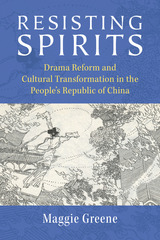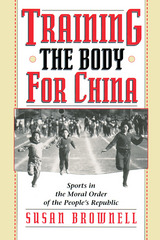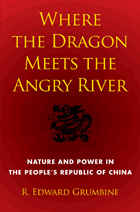
The problem of melding diverse ethnic groups into a single political entity is as old as human history. Marx's predictions to the contrary, modern socialist states have not escaped the tension of nationality: contentment or rebellion, pluralism or assimilation. June Teufel Dreyer, in what will be the basic study in its field, delineates China's determination to deal intelligently with its minorities.
The “forty millions” (Mongols, Tibetans, Koreans, Manchus, and some fifty other groups) are only 6 percent of China's total population, but the national government pays them special attention. First of all, these groups occupy almost two thirds of China's land area, in strategic frontier positions. Second, they occupy terrain rich in unworked minerals, undeveloped forests, and prolific supplies of domestic animals. The People's Republic attaches considerable importance to obtaining loyalty and maintaining political jurisdiction.
Dreyer examines the steps taken to achieve integration. In the process she also considers how the Communist Party's minority policy differs from that of previous Chinese governments and the Soviet Union; who the executors of this policy have been; what mechanisms have been used to carry it out; how minorities have reacted to the communist system; and how policy toward minorities differs from policy toward the Han majority. This deeply researched book is informed by considerations that transcend the Chinese setting. Many nations share the problem of race relations, and one nation's effort can lead to another nation's solution.

Constructing China presents a detailed examination of the means through which our knowledge of China is created. Rejecting the supposed objectivity of empirical statistics and challenging the assumption of a dichotomy between Western liberal democracy and Chinese authoritarianism, Mobo Gao dissects the political agenda and conceptual framework of commentators on China and urges those on the right and the left alike to be carefully critical of their own views on the nation’s politics, economics, and history.

This volume represents the fruits of a preliminary inquiry into one aspect of contemporary Chinese law-the criminal process. Investigating what he calls China's "legal experiment," Mr. Cohen raises large questions about Chinese law. Is the Peoples Republic a lawless power, arbitrarily disrupting the lives of its people? Has it sought to attain Marx's vision of the ultimate withering away of the state and the law? Has Mao Zedong preferred Soviet practice to Marxist preaching? If so, has he followed Stalin or Stalin's heirs? To what extent has it been possible to transplant a foreign legal system into the world's oldest legal tradition? Has the system changed since 1949? What has been the direction of that change, and what are the prospects for the future?
Today, immense difficulties impede the study of any aspect of China's legal system. Most foreign scholars are forbidden to enter the country, and those who do visit China find solid data hard to come by. Much of the body of law is unpublished and available only to officialdom, and what is publicly available offers an incomplete, idealized, or outdated version of Chinese legal processes. Moreover, popular publications and legal journals that told much about the regime's first decade have become increasingly scarce and uninformative.
In order to obtain information for this study, Mr. Cohen spent 1963-64 in Hong Kong, interviewing refugees from the mainland and searching out and translating material on Chinese criminal law. From the interviews and published works, he has endeavored to piece together relevant data in order to see the system as a whole.
The first of the three parts of the book is an introductory essay, providing an overview of the evolution and operation of the criminal process from 1949 through 1963. The second part, constituting the bulk of the book, systematically presents primary source material, including excerpts from legal documents, policy statements, and articles in Chinese periodicals. In order to show the law in action as well as the law on the books, the author has included selections from written and oral accounts by persons who have lived in or visited the People's Republic. Interspersed among these diverse materials are Mr. Cohen's own comments, questions, and notes. Part III contains an English-Chinese glossary of the major institutional and legal terms translated in Part II, a bibliography of sources, and a list of English-language books and articles that are pertinent to an understanding of the criminal process in China.

The popularization of basic legal knowledge is an important and contested technique of state governance in China today. Its roots reach back to the early years of Chinese Communist Party rule. Legal Lessons tells the story of how the party-state attempted to mobilize ordinary citizens to learn laws during the early years of the Mao period (1949–1976) and in the decade after Mao’s death.
Examining case studies such as the dissemination of the 1950 Marriage Law and successive constitutions since 1954 in Beijing and Shanghai, Jennifer Altehenger traces the dissemination of legal knowledge at different levels of state and society. Archival records, internal publications, periodicals, advice manuals, memoirs, and colorful propaganda materials reveal how official attempts to determine and promote “correct” understandings of laws intersected with people’s interpretations of written laws and with their experiences of laws in practice. They also show how diverse groups—including party-state leadership, legal experts, publishers, writers, artists, and local officials, along with ordinary people—helped to define the meaning of laws in China’s socialist society. Placing mass legal education and law propaganda at the center of analysis, Legal Lessons offers a new perspective on the sociocultural and political history of law in socialist China.

The popularization of basic legal knowledge is an important and contested technique of state governance in China today. Its roots reach back to the early years of Chinese Communist Party rule. Legal Lessons tells the story of how the party-state attempted to mobilize ordinary citizens to learn laws during the early years of the Mao period (1949–1976) and in the decade after Mao’s death.
Examining case studies such as the dissemination of the 1950 Marriage Law and successive constitutions since 1954 in Beijing and Shanghai, Jennifer Altehenger traces the dissemination of legal knowledge at different levels of state and society. Archival records, internal publications, periodicals, advice manuals, memoirs, and colorful propaganda materials reveal how official attempts to determine and promote “correct” understandings of laws intersected with people’s interpretations of written laws and with their experiences of laws in practice. They also show how diverse groups—including party-state leadership, legal experts, publishers, writers, artists, and local officials, along with ordinary people—helped to define the meaning of laws in China’s socialist society. Placing mass legal education and law propaganda at the center of analysis, Legal Lessons offers a new perspective on the sociocultural and political history of law in socialist China.

Law is a moving system of rules that changes according to a nation’s political and socioeconomic development. To understand the law of the People’s Republic of China today, it is imperative to learn the history and philosophy of the law when it was first shaped. This is a comprehensive introduction to Chinese legal scholarship and the prominent scholars who developed it during the initial decades of the PRC, when the old Chinese legal system was abolished by the newly established Communist government. With responsibilities for full-scale recovery and reconstruction, while cultivating entirely new disciplines and branches of legal studies, the thirty-three leading legal scholars featured herein became the creators, pioneers, and teachers of the new Communist legal system. Through their scholarship, we can see where the field of Chinese legal studies came from, and where it is going.
Nongji Zhang reveals the stories of the most prominent PRC legal scholars, including their backgrounds, scholarly contributions, and important works. This essential tool and resource for the study of Chinese law will be of great use to faculty, students, scholars, librarians, and anyone interested in the field.



In 2009, to mark the sixtieth anniversary of the People’s Republic of China, the Fairbank Center for Chinese Studies convened a major conference to discuss the health and longevity of China’s ruling system and to consider a fundamental question: After three decades of internal strife and turmoil, followed by an era of reform, entrepreneurialism, and internationalization, is the PRC here for the dynastic long haul?
Bringing together scholars and students of China from around the world, the gathering witnessed an energetic exchange of views on four interrelated themes: polities, social transformations, wealth and well-being, and culture, belief, and practice. Edited and expanded from the original conference papers, the wide-ranging essays in this bilingual volume remain true to the conference’s aim: to promote open discussion of the past, present, and future of the People’s Republic of China.


Training the Body for China is the first book on Chinese sports based on extended fieldwork by a Westerner. Brownell introduces the notion of "body culture" to analyze Olympic sports as one element in a whole set of Chinese body practices: the "old people's disco dancing" craze, the new popularity of bodybuilding (following reluctant official acceptance of the bikini), mass calisthenics, martial arts, military discipline, and more.
Translating official and dissident materials into English for the first time and drawing on performance theory and histories of the body, Brownell uses the culture of the body as a focal point to explore the tensions between local and global organizations, the traditional and the modern, men and women. Her intimate knowledge of Chinese social and cultural life and her wide range of historic examples make Training the Body for China a unique illustration of how gender, the body, and the nation are interlinked in Chinese culture.

Ed Grumbine traveled to the far corners of China’s Yunnan province to find out. He was driven by a single question: could this last fragment of wild nature withstand China’s unrelenting development? But as he hiked through deep-cut emerald mountains, backcountry villages, and burgeoning tourist towns, talking with trekking guides, schoolchildren, and rural farmers, he discovered that the problem wasn’t as simple as growth versus conservation.
In its struggle to "build a well-off society in an all-round way," Beijing juggles a host of competing priorities: health care for impoverished villagers; habitat for threatened tigers; cars for a growing middle class; clean air for all citizens; energy to power new cities; rubber for the global marketplace.
Where the Dragon Meets the Angry River is an incisive look at the possible fates of China and the planet. Will the Angry River continue to flow? Will Tibetan girls from subsistence farming families learn to read and write? Can China and the United States come together to lead action on climate change? Far-reaching in its history and scope, this unique book shows us the real-world consequences of conservation and development decisions now being made in Beijing and beyond.
READERS
Browse our collection.
PUBLISHERS
See BiblioVault's publisher services.
STUDENT SERVICES
Files for college accessibility offices.
UChicago Accessibility Resources
home | accessibility | search | about | contact us
BiblioVault ® 2001 - 2024
The University of Chicago Press









